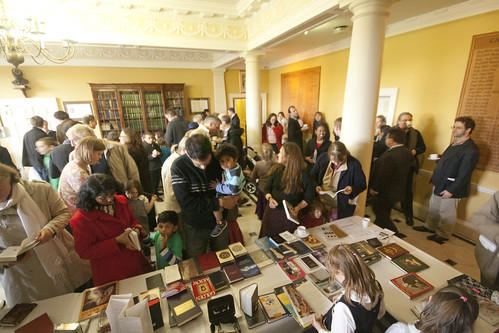 |
| The local Church? |
Part 1: Where next?
Part 2: What do we need?
Part 3: The Lay Apostolate: a proposal
Part 4: Why not existing groups?
Part 5: The Lay Apostolate and the Internet
To summarise the conclusions of yesterday's post:
It is very hard to get people to come to physical meetings with any frequency. They are too busy and are spread too thinly.
Therefore, groups of any kind which depend upon people coming to weekly or even monthly meetings are going to find it very difficult to make headway.
But that is exactly the historical model we have for the lay apostolate: people getting together to meet, to worship or pray together, to do some kind of good work, to talk about the difficulties of being a Catholic in their professions, or whatever it might be.
The tempting idea that people should be shamed or compelled to give more time to this kind of thing is mistaken because Catholics are NOT being unreasonable. It is genuinely harder to get to these meetings than it was in the past. They live further from the parish church, or any other fixed meeting place, and they have less time. They haven't become more selfish: Putnam has some interesting data on how the amount of volunteering has actually increased over the same decades as all these groups have been withering, and the withering has affected leisure and business groups just as much as charitable or religious ones. We can't blame the wind and the sea, we have to work with them as best as we can.
 |
| If you like this, then... |
So: what exactly do we want to achieve in a lay group?
We do want to give people a sense of belonging, and contact with like-minded people. The collapse of local groups and local community has made people need this more than ever. Sodalities which never meet - like the Latin Mass Society's Sodality of St Augustine - have their uses, but they don't meet this need.
I mention the social aspect first because I've come to this through Putnam's research, but obviously we also want to advance the good things which were once advanced by the local groups: personal sanctification and all kinds of good works. Groups and extra parish devotions and activities have always taken the average Catholic beyond the basic level of going to Mass on Sunday, and this is still needed.
So: what we need must have the following features.
 |
| ...you've got a lot in common with them. |
2. Physical, face-to-face meetings are a necessary supplement to anything based on a newsletter or internet communication, because we just have to meet people in the flesh to get to know them. (Think of the desire bloggers have to meet up: an interesting side-phenomenon of the new media.) But we have to think more in terms of quarterly events rather than weekly ones. Some events can be multiday events, such as retreats, which make long-distance travel worthwhile, and facilitate more social interaction.
3. In order to work, members must be connected by common experience and aspiration far more than in the standard parish group. This will be the case if the group is committed to the traditional Mass, because attachment to the Traditional Mass will give members at least the same level of common experience and attitude which, fifty years ago, you'd have had in a local group of Catholic writers or plumbers, or the parish ladies.
Ok, so what is the proposal? See the next post.
I think this analysis is right. A lay organisation, which can fill the same role for the laity as the Confraternity of Catholic Clergy does for priests, is much needed. Is it necessary to create such a body de novo, however? Why not take over something like the Newman Association. I would guess it is pretty much moribund, with an elderly membership. Orthodox 'circles' could be established and affliated to the national association, and in the not to distant future come to dominate it.
ReplyDeleteWhy not take over something established? A good question. It is sad to see venerable institutions go to the wall. Nevertheless, there are a number of reasons against it.
ReplyDelete1. I don't like entryism. Why should the old guard of some semi-moribund organisation be displaced by a bunch of people interested not in their ideas and traditions, but in their network, prestige, and bank account?
2. The resources of these sorts of groups are not, in general, worth having. A mailing list of people in their 70s and £2.50 in the bank. They haven't done anything for twenty years so no one has heard of them. Their official aims and procedures would hamper anything new, as would their staff and memberships.
3. What we need is something explicitly identified with the Traditional Mass, because this is the only thing which is able to provide the sense of common identity and purpose for members. This is impossible with these old groups, the existing members would never stand for it.